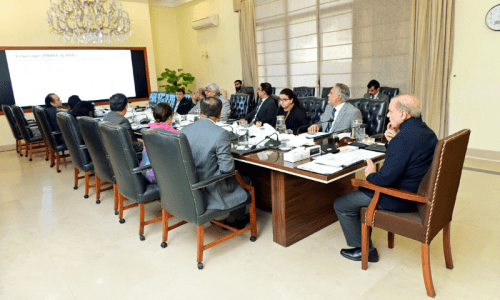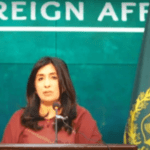ISLAMABAD: Prime Minister Shehbaz Sharif approved the start of a Rs7.5 billion Ramadan package for the underprivileged, which enables them to purchase necessities at reduced prices from all 4,775 utility stores nationwide.
The prime minister presided over a meeting that approved the PM Ramazan package. The meeting began on Thursday and will go till “Chand Raat,” or the night before Eidul Fitr.
The Prime Minister’s Office (PMO) reports that about 40 million low-income families will receive a subsidy of Rs7.5 billion to purchase necessities at discounted prices.
A 20 kg bag of wheat flour and 70 kg of ghee or edible oil will each receive a subsidy of Rs77 per kg under the package.
Utility stores are providing nineteen commodities, such as rice, flour, legumes, ghee, edible oil, sugar, and milk.
The prime minister gave the relevant authorities instructions to maintain monitoring in this area and to avoid compromising on the standard or quality of commodities that are subsidized. He said that in order to prevent difficulty for consumers, special sale stations for the distribution of flour must be developed.
PM Sharif emphasized tight oversight to make sure that no worthy person encounters any difficulties during the distribution of the package, while presiding over a high-level meeting on Thursday in Islamabad about the Ramazan package and the Benazir Income Support Programme (BISP).
In order to further facilitate the distribution of the package—especially the inexpensive flour—the prime minister gave the relevant officials instructions to set up mobile units and add more counters. Additionally, he said that hoarders who artificially inflate the cost of necessities would face severe consequences.
In order for as many eligible families to benefit from the package as possible, Prime Minister Sharif insisted on starting a nationwide awareness campaign. He went on to say that in order to address complaints from individuals right away, the system needs to be made more efficient and interconnected.
The Prime Minister additionally instructed pertinent authorities to allocate a BISP quarterly installment of Rs10,500 to eligible individuals and supplement it with an extra Rs2,000 per family in Balochistan.
Commercialization
Prime Minister Sharif ordered the expeditious strengthening of the capabilities of departments associated with the privatization process during a separate meeting.
“It is imperative that barriers in the privatization process are eliminated as soon as possible to enable the nation to avoid losing billions of rupees and enhance its economic standing,” he continued.
The prime minister instructed the submission of information on activities and goals with a clear determination of time frames after reviewing the entire list and progress report of all institutions involved in the privatization process.
Additionally, he gave the Privatization Commission and the ministry instructions to bring up outstanding matters pertaining to privatization before the cabinet as soon as possible so that prompt judgments could be made—furthermore postponement was not an option.
PM Sharif ordered the formation of a review group, whose recommendations would be forwarded to the prime minister, regarding the idea of transferring control of the electricity distribution firms to the provinces.
He emphasized that all process bottlenecks need to be addressed and made it very evident that the Privatization Commission and the ministry bear full responsibility for the privatization process.
Quality, openness, and the interests of the country will come first, the PM emphasized, emphasizing the need to foster a climate of corporate competitiveness and public service as prerequisites for progress.
“Institutions and ministries should provide professional and passionate solutions, since it is about improving Pakistan.”
A summary of the current state of affairs regarding the privatization of Pakistan Steel Mills Corporation, House Building Finance Corporation, First Woman Bank, Roosevelt Hotel, Heavy Electrical Complex, power plants, distribution companies, and other loss-making organizations was presented during the meeting.
The meeting was informed that the deadline for proposals to outsource the airport was March 5.








